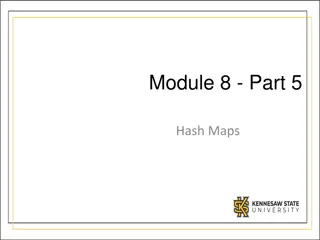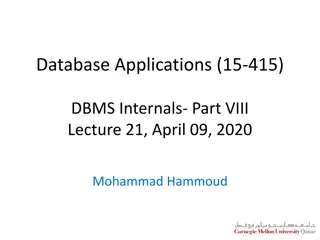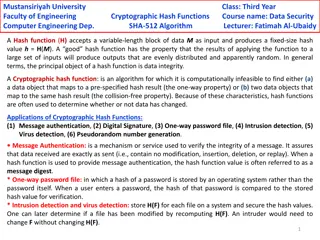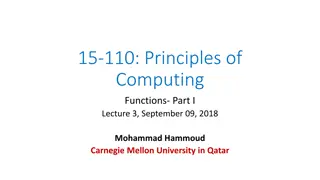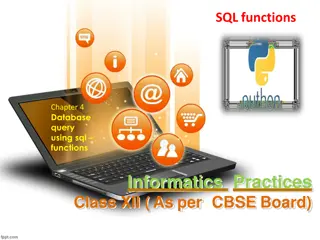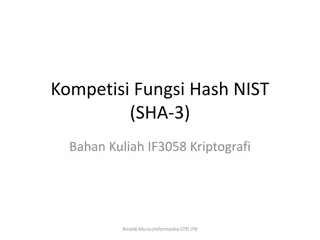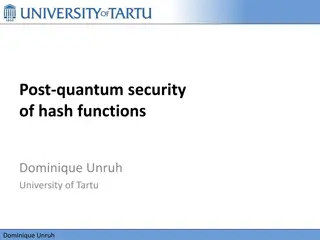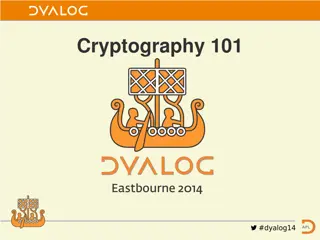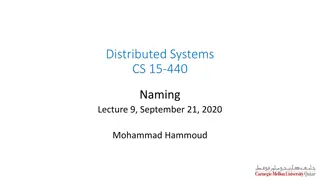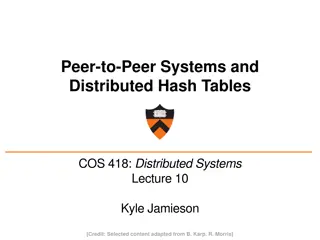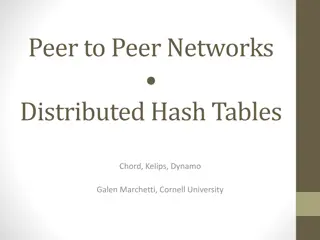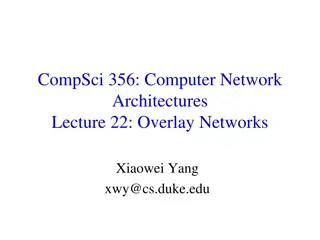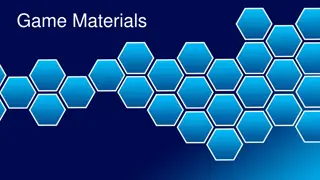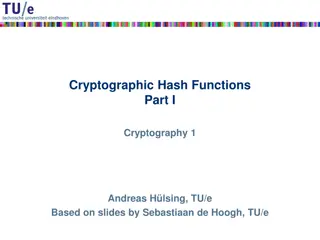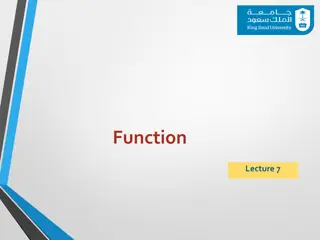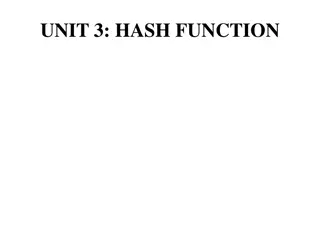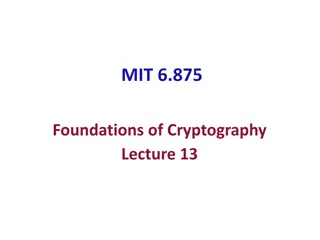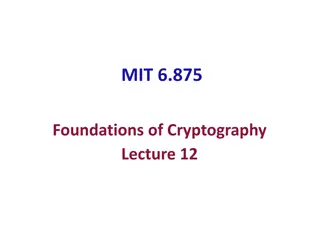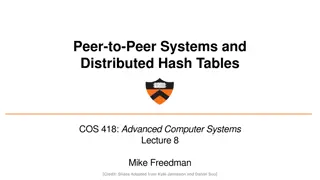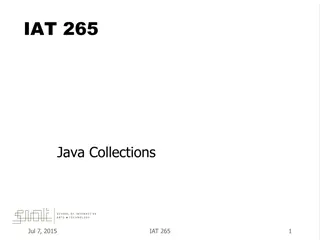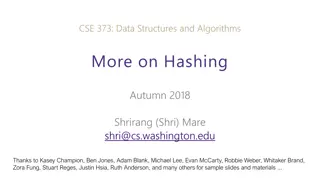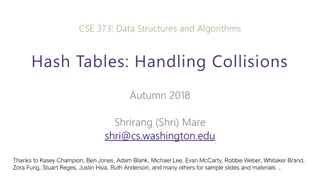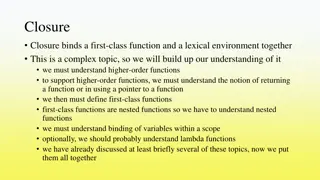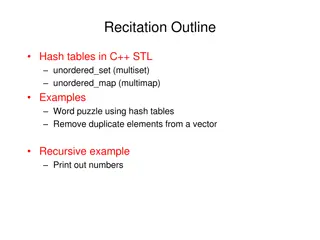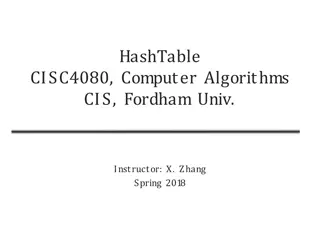Understanding Hash Maps: A Common Data Structure
In this module, learn about Hash Maps, a common data structure used in various programming languages like Java, C#, C++, Python, and PHP. Hash Maps allow you to store key-value pairs without duplicate keys, making it efficient for mapping relationships between data elements. Explore how to declare,
6 views • 16 slides
Quick Hash Delivery in Ottawa Canafast.ca
Craving premium hashish in Ottawa? Look no further. Our service offers prompt and discreet hash delivery right to your doorstep in Ottawa. Indulge in the finest hash products without leaving the comfort of your home.
3 views • 6 slides
Understanding Hash Join Algorithm in Database Management Systems
In this lecture, Mohammad Hammoud explores the Hash Join algorithm, a fundamental concept in DBMS query optimization. The algorithm involves partitioning and probing phases, utilizing hash functions to efficiently join relations based on a common attribute. By understanding the intricacies of Hash J
1 views • 41 slides
Livestock Marketing Functions and Classification
Livestock marketing involves various functions such as exchange, physical supply, facilitative functions like grading, transportation, storage, and more. These functions are classified into primary, secondary, and tertiary functions based on their roles. Assembling, processing, distribution, and equ
3 views • 23 slides
Understanding Cryptographic Data Integrity Algorithms
Cryptographic data integrity algorithms ensure data integrity, verifying data received matches what was sent by authorized entities. Cryptographic hash functions play a crucial role in ensuring data integrity through hash values. Applications include message authentication, digital signatures, and v
3 views • 41 slides
Cryptographic Hash Functions in Data Security: Mustansiriyah University Course Overview
Cryptographic hash functions play a crucial role in ensuring data integrity and security. This course at Mustansiriyah University's Faculty of Engineering covers the SHA-512 algorithm and its applications in various fields such as message authentication, digital signatures, and intrusion detection.
0 views • 6 slides
Understanding Functions in Python: Basics and Usage
In this lecture on functions in Python, the focus is on the basics of defining and using functions. The session covers the formal definition of functions, parameters, local and global scopes of variables, return values, and pass-by-value concept. It emphasizes the importance of proper indentation in
1 views • 28 slides
Understanding Functions: Tables, Graphs, and Formulas Based on Functions, Data, and Models
Explore the world of functions through tables, graphs, and formulas in this presentation based on the book "Functions, Data, and Models" by S.P. Gordon and F.S. Gordon. Learn how functions in the real world work, understand the relationship between variables, and see different representations of fun
0 views • 29 slides
Understanding SQL Functions for Database Queries
SQL functions are essential elements in performing actions and obtaining results in a database query. They come in two main types: scalar functions and aggregate functions. Scalar functions operate on single values, while aggregate functions operate on sets of data. Examples of SQL functions include
0 views • 14 slides
Shifting Bloom Filters at Peking University, China
Explore the innovative research on Shifting Bloom Filters conducted at Peking University, China, featuring evaluations, conclusions, background information, and insights on membership, association, and multiplicity queries. The study delves into hash functions, theoretical results, and the Shifting
1 views • 25 slides
Buy Playboy Hash Online - globaldrugsstore.com
Buy Playboy Hash Online is an Indica dominant hash that originated from Morocco where it is widely known to produce some of the best hash in the world. This hash is quite potent but very easy on the throat. It smokes incredibly smooth and has a sweet
1 views • 3 slides
Understanding Distributed Hash Tables in Peer-to-Peer Systems
Distributed Hash Tables (DHTs) are a fundamental component in organizing nodes in peer-to-peer networks. By using hash functions to assign keys to peers, DHTs enable efficient storage and retrieval of objects. Peers in a DHT are responsible for storing and managing key-value pairs, with each key bei
0 views • 31 slides
CSE 373 - Hashing Concepts and Exam Preparation
Introduction to hashing in CSE 373, covering basic concepts, hash functions, collision resolution, and runtimes. Exam details for Friday's practice exam include topics on Stacks, Queues, BigO Notation, Heaps, Trees, Design Tradeoffs, and exam format with emphasis on theoretical understanding. Lectur
0 views • 38 slides
Kompetisi Fungsi Hash NIST (SHA-3): Proses Pemilihan Finalis dan Detail Desain
Seperti sejarah AES, National Institute of Standards and Technology (NIST) menyelenggarakan kompetisi terbuka untuk mengembangkan fungsi hash baru yang disebut SHA-3. Kompetisi ini diadakan dari tahun 2007 hingga Oktober 2012. Proses pemilihan terdiri dari 2 putaran dan babak final dengan total 64 s
0 views • 17 slides
Post-Quantum Security of Hash Functions Explained
Explore the intricacies of post-quantum secure hash functions, their properties, surprises, and implications in quantum settings. Delve into collision resistance, pseudo-random generators, efficient signatures, and more, presented by Dominique Unruh from the University of Tartu.
0 views • 23 slides
Understanding Hash Joins and Symmetric Hash Joins in Database Queries
Hash joins and symmetric hash joins are key techniques used in database queries to efficiently access and combine data from multiple tables. Hash joins load candidate records into hash tables for quick probing, while symmetric hash joins maintain two hash tables with two hash functions. Despite thei
0 views • 8 slides
Understanding Cryptography Basics and Toolbox
Cryptography serves the goals of managing who can view data, ensuring data integrity, and verifying the origin of data. It involves dramatis personae like Alice, Bob, Eve, and Oscar. The toolbox includes hash functions, symmetric encryption, and asymmetric encryption. Hash functions play a crucial r
0 views • 32 slides
Understanding Distributed Hash Table (DHT) in Distributed Systems
In this lecture, Mohammad Hammoud discusses the concept of Distributed Hash Tables (DHT) in distributed systems, focusing on key aspects such as classes of naming, Chord DHT, node entities, key resolution algorithms, and the key resolution process in Chord. The session covers various components of D
0 views • 35 slides
Overview of Peer-to-Peer Systems and Distributed Hash Tables
The lecture discusses Peer-to-Peer (P2P) systems and Distributed Hash Tables, exploring their architecture, benefits, adoption in various areas, and examples such as BitTorrent. It covers the decentralized nature of P2P systems, the challenges they address, and the advantages they offer including hi
0 views • 56 slides
Evolution of Peer-to-Peer Networks and Distributed Hash Tables
Peer-to-peer networks and distributed hash tables have evolved significantly over the years, from the early days of ARPANET to the emergence of decentralized systems like Chord, Kelips, and Dynamo. This evolution has brought about a shift towards greater decentralization, improved scalability, and e
0 views • 39 slides
Understanding Consistent Hashing and Distributed Hash Table
Explore the concept of consistent hashing and distributed hash tables to efficiently store and retrieve web pages across multiple servers. Learn how hashing functions and algorithms can distribute data evenly, handle server additions smoothly, and minimize object relocations. Discover the benefits o
1 views • 36 slides
Understanding Overlay Networks and Distributed Hash Tables
Overlay networks are logical networks built on top of lower-layer networks, allowing for efficient data lookup and reliable communication. They come in unstructured and structured forms, with examples like Gnutella and BitTorrent. Distributed Hash Tables (DHTs) are used in real-world applications li
0 views • 45 slides
Blockchain Voting and Node Instructions with ASCII Table
This game material outlines a block voting process using a blockchain framework, including hash calculations, node instructions, and an ASCII table. Participants are required to verify valid hashes, faculty votes, and correct hash computations based on predetermined algorithms. The provided ASCII ta
0 views • 41 slides
Understanding Cryptographic Hash Functions
Cryptographic hash functions play a crucial role in various aspects of security, including integrity protection, checksum generation, password hashing, digital signatures, and more. They are designed to efficiently convert input data of arbitrary length into fixed-length output, aiding in tasks like
0 views • 32 slides
Understanding Composition of Functions in Mathematics
Learn how to perform operations with functions, find composite functions, and iterate functions using real numbers. Explore the composition of functions through examples and understand the domain of composite functions. Enhance your mathematical skills by mastering operations like addition, subtract
0 views • 10 slides
Adapting Linear Hashing for Flash Memory Constrained Embedded Devices
This research explores the adaptation of linear hashing for improved data handling on flash memory-constrained embedded devices. Motivated by the increasing data collection by IoT devices, the study focuses on implementing database structures like a linear hash table for efficient data processing. T
0 views • 67 slides
Understanding Functions in C Programming
Functions play a vital role in C programming by enabling the execution of specific tasks. They can be pre-defined or user-defined, offering flexibility and efficiency in code organization and execution. Pre-defined functions are already available in C libraries, while user-defined functions are cust
0 views • 46 slides
Understanding Hash Functions in Data Structures
Hash functions are crucial in storing data efficiently by converting a sized amount of data into a single integer. They are used to generate hash values, hash codes, or hash sums, which serve as indexes in arrays. The hash function should be quick to compute and distribute hash addresses uniformly t
0 views • 200 slides
Cryptographic Algorithms and Hash Collisions Overview
Explore the world of cryptographic algorithms and hash collisions. Learn about various hashing algorithms like MD5, SHA-1, SHA-256, and more. Dive into the concepts of symmetric and asymmetric key algorithms and understand the risks associated with hash collisions. Discover the implications of post-
0 views • 58 slides
Understanding the Relationship between Decisional Second-Preimage Resistance and Preimage Resistance in Cryptographic Hash Functions
This work delves into the subtle question of when Decisional Second-Preimage Resistance (SPR) implies Preimage Resistance (PRE) in hash functions. It presents a tool for enabling tight security proofs for hash-based signatures by exploring the success probability of adversaries against collision res
0 views • 25 slides
Foundations of Cryptography: Digital Signatures and Collision-Resistant Hash Functions
Foundations of Cryptography explores the construction of digital signature schemes and collision-resistant hash function families using one-way functions and safe primes. The content delves into the concept of collision-resistant hash functions and their construction from the discrete logarithm prob
0 views • 31 slides
Foundations of Cryptography: Lecture 12 - Digital Signatures and Collision-Resistant Hash Functions
The lecture covers the construction of collision-resistant hash functions from discrete log, the security behind it, and the implications for digital signature schemes. It delves into the theoretical foundations of cryptography, showcasing the interplay between one-way functions, hash functions, and
0 views • 25 slides
Understanding Peer-to-Peer Systems and Distributed Hash Tables
Explore the world of Peer-to-Peer Systems and Distributed Hash Tables through a lecture by Mike Freedman, covering topics like Napster, Gnutella, BitTorrent, and the challenges they present.
0 views • 48 slides
Understanding Data Structures and Hashing in Java
Data structures play a crucial role in organizing, iterating, adding, deleting, and searching data efficiently. Hash tables, linked lists, trees, and more are explored in this overview, highlighting their strengths and trade-offs. Hashing, collision resolution strategies, and the importance of a wel
0 views • 19 slides
Understanding Peer-to-Peer Systems and Distributed Hash Tables
Explore the concept of Peer-to-Peer (P2P) systems and Distributed Hash Tables (DHTs) through lectures covering topics like Napster, Gnutella, BitTorrent, Chord Lookup Service, and more. Understand the advantages and adoption of P2P systems, with examples like BitTorrent and the lookup problem in a d
0 views • 56 slides
Comprehensive Overview of CSE 373 Data Structures and Algorithms Course - Autumn 2018
This document provides detailed information about the CSE 373 Data Structures and Algorithms course in Autumn 2018, presented by Shrirang (Shri) Mare. It covers topics such as hashing, collision strategies, hash tables, design decisions, testing, and more. The content includes announcements, midterm
0 views • 25 slides
Understanding Hash Tables and Handling Collisions
This content covers the concepts of hash tables, handling collisions, and efficient implementation of dictionary operations. It explores methods like direct-access tables, converting keys to non-negative integers, and using functions to work with non-integer keys. The discussion includes approaches
0 views • 32 slides
Understanding Closures, Lambda Functions, and Higher-Order Functions in Programming
In programming, closures bind functions and lexical environments, while lambda functions are nameless and used by higher-order functions. Higher-order functions operate by applying other functions, such as map and fold functions. Example implementations in LISP demonstrate how these concepts are uti
1 views • 16 slides
Comprehensive Guide to Hash Tables in C++ STL: Unordered Set, Multiset, Unordered Map, and Multimap
Explore the implementation of hash tables in C++ STL using unordered_set, multiset, unordered_map, and multimap. Learn how to insert, search, and erase elements, along with practical examples like word puzzles and removing duplicates from vectors. Dive into recursive functions and efficiently manage
0 views • 6 slides
Understanding Hash Tables and Hashing Concepts in Computer Algorithms
This content delves into the concept of Hash Tables, covering topics such as the support for dictionary operations, achieving constant time through direct address tables, case studies in web server maintenance, and an exploration of hashing functions and collision avoidance. It also touches upon key
0 views • 40 slides
